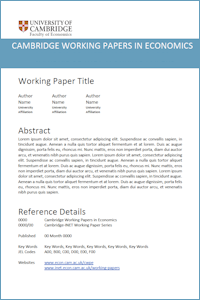
Palma, J. G.
Why is inequality so unequal across the world? Part 2 The diversity of inequality in market income ─ and the increasing asymmetry between the distribution of income before and after taxes and transferences
CWPE19100
Abstract: This is a two-part paper. Part 1 addresses the diversity in the distribution of disposable income across the world; and Part 2, that in market income (i.e., before taxes and transferences). There are many underlying questions to these phenomena: does the diversity of inequality in disposable incomes reflect a variety of fundamentals, or a multiplicity of power structures and choice? Is rising market inequality the product of somehow ‘exogenous’ factors (e.g., r>g), or of complex interactions between political settlements and market failures? If the latter, how do we get through the veils obscuring these interactions and distorting our vision of the often self-constructed nature of inequality? Has neoliberal globalisation broadened the scope for “distributional failures” by, for example, triggering a process of “reverse catching-up” among OECD countries, so that now highly unequal middle-income countries like those in Latin America embody the shape of things to come? If so, are we are all now converging towards features such as mobile élites creaming off the rewards of economic growth, and ‘magic realist’ politics that lack self-respect if not originality? (Should I say, ‘Welcome to the Third World’?) In Part 1 I also develop a new approach for examining and measuring inequality (distance from distributive targets). In turn, Part 2 concentrates on three issues: why there has been such a deterioration of market inequality among countries of the OECD, why this has led to a growing asymmetry between their distributions of market and of disposable incomes, and why inequality seems to move in "waves". The main conclusion is that to understand current distributive dynamics what matters is to comprehend the forces determining the share of the rich — and, in terms of growth, what they choose to do with it (and how they are allowed do it).
Keywords: income distribution, inequality, ideology, reverse catching-up, institutional persistence, neo-liberalism, new left, poverty, Latin America, Southern Africa, US, Western and Eastern Europe, emerging Asia, Palma ratio and sectors
JEL Codes: D31 E11 E22 E24 E25 I32 J31 N16 N30 N36 O50 P16
Author links: Jose Gabriel Palma
PDF: https://www.econ.cam.ac.uk/research-files/repec/cam/pdf/cwpe19100.pdf 
Open Access Link: https://doi.org/10.17863/CAM.47821
